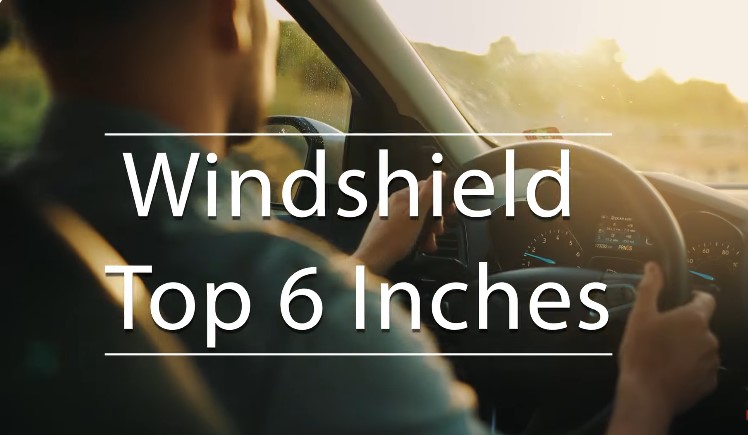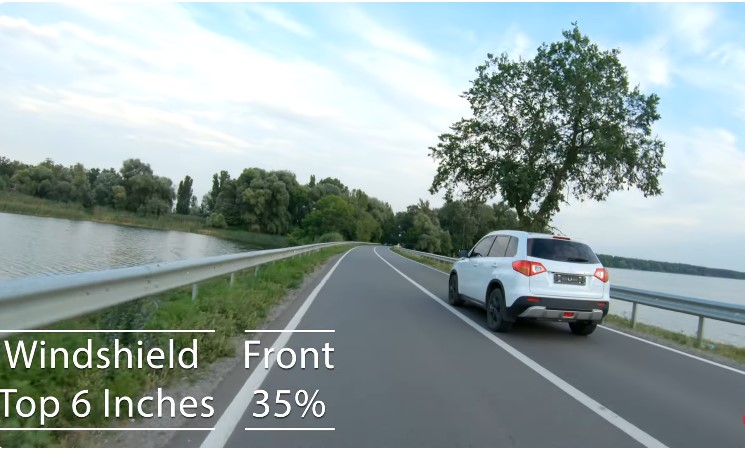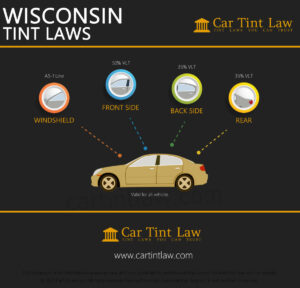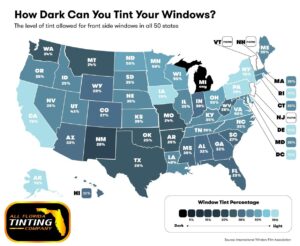As an Amazon Associate, I earn from qualifying purchases
Car window tinting makes your vehicle look stylish. It also protects you from sunlight and gives you privacy. But in Tennessee, there are laws about how dark your car windows can be. If you do not follow these rules, you may get a fine. In this guide, we will explain the Window Tinting Laws in Tennessee in very simple words. We will cover tint darkness (VLT), tint reflection (VLR), and other important rules.
1. Window Tint Darkness in Tennessee (VLT)
VLT means Visible Light Transmission. It tells how much light passes through your car windows. A lower VLT number means a darker tint. For example, 35% VLT lets 35% of light in, while 5% VLT (limo tint) lets only 5% of light in.
Tennessee has different rules for passenger cars and SUVs/vans.

Tint Darkness for Passenger Cars (Sedans):
- Windshield: You can use 70% tint. You can have any darkness on the AS-1 line (a small strip on top of the windshield).
- Front Side Windows: You can use 35% tint.
- Back Side Windows: You can use 35% tint.
- Rear Window: You can use a 35% tint.
Tint Darkness for SUVs and Vans:
- Windshield: You can use 70% tint above the AS-1 line.
- Front Side Windows: You can use 35% tint.
- Back Side Windows: Any tint darkness is allowed.
- Rear Window: Any tint darkness is allowed.
If you tint your windows too darkly, police may stop you. You could get a fine between $130 $300.
2. Window Tint Reflection in Tennessee (VLR)
VLR stands for Visible Light Reflection. It shows how much light your window tint reflects. Some tints have a shiny, mirror-like appearance. Tennessee has rules about this.
Tint Reflection for Passenger Cars (Sedans):
- Front Side Windows: No metallic or mirrored tint allowed.
- Back Side Windows: No metallic or mirrored tint allowed.
Tint Reflection for SUVs and Vans:
- Front Side Windows: No metallic or mirrored tint allowed.
- Back Side Windows: No metallic or mirrored tint allowed.
3. Other Tennessee Window Tint Rules
Tennessee has more laws about car window tinting. Let’s go through them one by one.
Side Mirrors
- No restrictions. You can use any type of side mirror.
Restricted Tint Colors
- Tennessee does not ban any tint colors. However, the tint must adhere to darkness and reflection laws.
Certificates for Window Tint
- Manufacturers do not need a special certificate to sell tint.
- Installers must make sure the tint follows Tennessee laws.
Sticker Requirement
- A sticker must be placed between the film and glass on the driver’s side window.
- This sticker shows that the tint is legal.
Medical Exemptions
- People with certain medical conditions can get special tint permission.
- Medical conditions include skin diseases, eye problems, or sensitivity to sunlight.
- To apply, you need a doctor’s note.
4. Penalties for Illegal Window Tint
If your tint does not follow the law, you may get a fine between $130 and $300.
- If you get caught once, you pay a fine.
- If you get caught again, you may have to remove the tint or pay a higher fine.
Police officers use a VLT meter to check your window tint. If your tint is too dark, you must fix it to avoid more fines.
5. Benefits of Legal Window Tint
Following Tennessee tint laws keeps you safe and avoids fines. But legal window tint also has other benefits:
- Protects Your Skin – Blocks harmful UV rays that can cause skin problems.
- Reduces Heat – Keeps your car cooler in hot weather.
- Prevents Glare – Helps you see better when driving in bright sunlight.
- Increases Privacy – Makes it harder for people to see inside your car.
- Protects Interiors – Prevents fading and cracking of seats and dashboard.
6. How to Check if Your Tint is Legal
I’m not sure if your tint follows Tennessee law. Here’s how to check:
- Use a Tint Meter – A tint meter measures VLT percentage. You can buy one online or visit an auto shop.
- Visit a Tint Shop – Professionals can check if your tint is legal.
- Look for the Sticker – Your tint installer should place a sticker on the driver’s side window.

If your tint is too dark, you may need to remove it or replace it with a legal one.
Frequently Asked Questions (FAQs)
1. Can I use 5% (limo) tint in Tennessee?
No. The darkest legal tint for most car windows is 35% VLT. Only the backside windows on SUVs and vans can be darker.
2. Can police stop me for window tint?
Yes. If your tint looks too dark, police may stop you and check it with a VLT meter.
3. Is mirror tint legal in Tennessee?
No. You cannot use metallic or mirrored tint on any car windows.
4. Do I need a sticker for legal tint?
Yes. A sticker must be placed on the driver’s side window to show the tint is legal.
5. Can I get a medical exemption for a darker tint?
Yes. If you have a medical condition, a doctor can give you a note to apply for a tint exemption.
Conclusion
Tennessee has clear rules about car window tinting. The legal tint for most windows is 35% VLT, and no metallic or mirrored tint is allowed. If you don’t follow these rules, you could get a fine between $130 and $300.
To avoid problems, check your window tint darkness, reflection, and stickers. If you need a darker tint for medical reasons, ask a doctor for an exemption.
By following the rules, you can enjoy safe and legal tinted windows in Tennessee.
As an Amazon Associate, I earn from qualifying purchases


